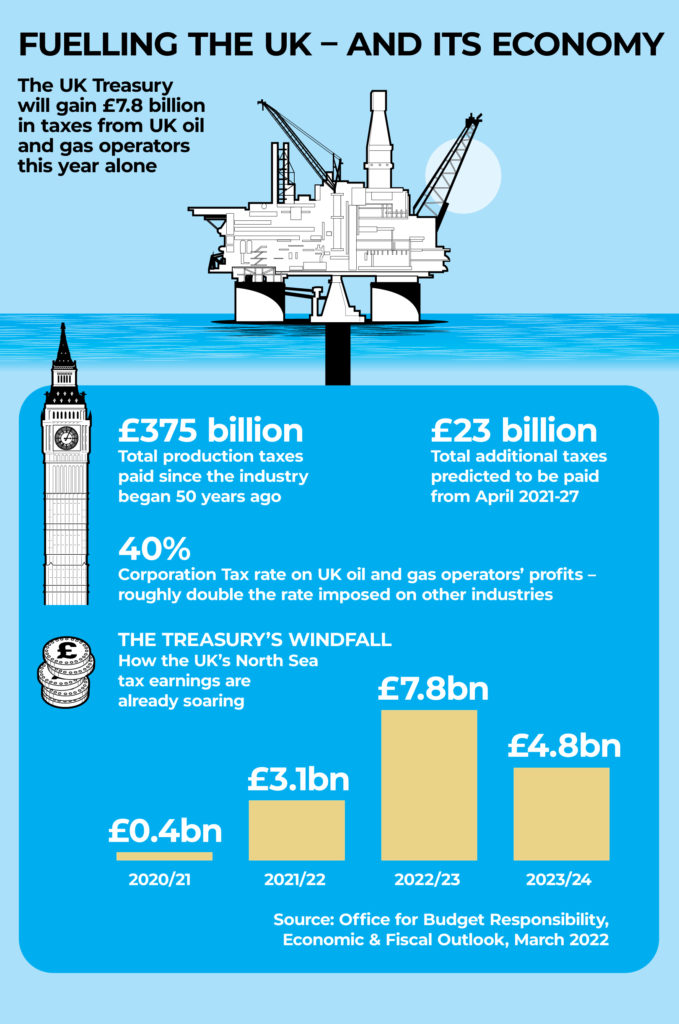The new taxes imposed on the UK’s offshore oil and gas operators are a backward step by a government which, just weeks ago, pledged to build a greener and more energy-independent nation, Offshore Energies UK said today.
The Energy Profits Levy, announced today, will discourage UK offshore energy investments, meaning declines in oil and gas exploration and production, and so force an increase in imports. This is the exact opposite of what was promised in the British Energy Security Strategy published just last month, warned Deirdre Michie, OEUK’s chief executive.
She said investor confidence depended on taxes being predictable so the introduction of a new one, without any formal consultation, would also undermine investment in offshore wind and other low-carbon energies – whose expansion was another key element of last month’s strategy.
Michie was responding to chancellor Rishi Sunak’s announcement that, under the levy, the industry would have to pay £5 billion in new taxes this year. Those taxes are in addition to the £7.8 billion the UK offshore oil and gas operators are already due to pay this year (a 20-fold increase on two years ago), which already equate to about £279 per UK household.
The government had opposed calls for a windfall tax, so today’s announcement has disappointed the industry, undermined trust and created long-lasting uncertainty over future investment. The new tax will take effect today, meaning it could undermine investments for years ahead. OEUK today said it would review the proposals in full, including the impact of the new investment allowance.
Michie said she recognised that surging energy bills meant an exceptionally tough year for consumers, so help was vital – but funding that help through sudden new taxes was damaging to British business.
Those hit hardest, she warned, would include not just the major operators, but also the many other companies in the UK supply chain, providing specialised equipment and services to the oil gas and renewable industries. The oil and gas sector supports about 200,000 UK jobs – most of them in such companies – whose workers will now be facing a less-secure future.
The industry would, she said, do its best to work with government for now but called for an ‘Energy Summit’ involving Downing Street, the Chancellor and leaders from the UK’s offshore energy operators and supply chains.
Michie said: “This is a disappointing and worrying development for industry, the shockwaves of which will be felt in offshore energy jobs and communities, and by consumers, for years to come.

“In April we welcomed the government’s British Energy Security Strategy, which pledged ‘Secure, clean and affordable British energy for the long term’. We thought long-term meant years or decades, but it seems to have meant just a few weeks.
“The strategy’s focus was on attracting investment to build a greener energy system to reduce dependence on imports. These new taxes will achieve the exact opposite of what the government promised in April.
“They will drive away investors and so reduce UK energy production. That means less oil, less gas, and less renewables. It also makes it much harder for the UK to reach net zero by 2050.”
“It’s essential to help consumers through this cost-of-living crisis but damaging the energy industry through sudden new taxes is the wrong approach. The short-term gain is small, but the long-term pain will be huge. In just a few years the UK will be even more reliant on other countries for its energy and consumers will still face rising bills.
“Right now, the key task is to prevent a flood of investment formerly earmarked for UK energy projects now being diverted to other countries.
“We need Downing Street and the Treasury to work with us to avoid the UK being starved of the tens of billions of pounds of investment needed to build the energy systems and energy security that will protect UK consumers from more crises like this one.”
How will the Energy Profits Levy work?
- Currently, the oil and gas sector pay a 40% headline rate tax on profits consisting of 30% Ring Fenced Corporation Tax and 10% Supplementary Charge.
- The Energy Profits Levy is an additional 25% tax on UK oil and gas profits on top of the existing 40% headline rate of tax, taking the combined rate of tax on profits to 65%.
- Companies will not be able to offset previous losses or decommissioning expenditure against profits subject to the levy.
- It is expected to raise around £5 billion in its first 12 months.
- The tax will take effect from today, 26 May 2022, and will be legislated for via a standalone Bill to be introduced shortly.
- In future years, if oil and gas prices return to historically more normal levels, the Government will phase out the Energy Profits Levy, and also the legislation will include a sunset clause, effective at the end of December 2025.

Share this article
